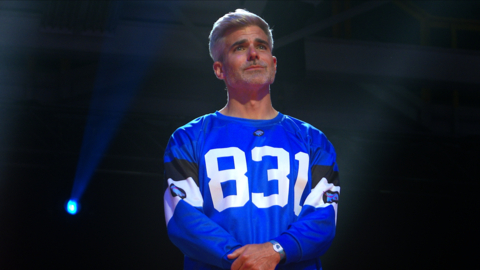
Jeff Allen Wins $10 Million Grand Prize on “Beast Games,” Raising Awareness for Creatine Transporter Deficiency
This week, the Association for Creatine Deficiencies’ (ACD) Vice-Board Chair Jeffrey Randall Allen was crowned champion of Prime Video’s “Beast Games,” winning “the largest cash prize in TV history” to support research and raise awareness for his son’s rare disease.
This press release features multimedia. View the full release here: https://www.businesswire.com/news/home/20250214526104/en/

Jeffrey Randall Allen, winner of competition TV show "Beast Games," poses for a photo. Allen competed on the show to raise awareness about his son Lucas' rare genetic disorder, Creatine Transporter Deficiency (CTD). (Photo: Business Wire)
Allen’s son Lucas has Creatine Transporter Deficiency (CTD), a rare genetic disorder that limits the brain’s ability to access creatine—an essential compound for energy and development. This condition impacts speech, cognitive abilities, and motor function. Currently, there is no approved treatment for the disease.
"We would love nothing more than to help all the kids diagnosed, thousands not yet diagnosed, and those yet to be born with CTD," said Allen. "I know we can make a difference. We have so many researchers across the world doing amazing work, but as an ultra-rare disease it doesn’t get the attention it deserves. If we could fund more research, we will find a cure for this."
“Beast Games” is a TV competition created by viral YouTuber Jimmy “MrBeast” Donaldson that began with 1,000 competitors vying to win the grand prize. Allen competed as contestant #831, enduring intense physical, mental and social challenges to compete for the number one spot.
Allen’s son Lucas is a joyful, loving, and resilient seven-year-old boy who faces daily challenges due to CTD. Until a treatment or cure is found to get creatine into his brain, Lucas will continue to need countless hours of therapy to learn to do things like talk, dress himself and perform basic self-care skills. With no effective treatment available for patients like Lucas, research is crucial to finding therapies that could change Lucas’ life and the lives of the hundreds of others living with CTD, and likely thousands more who have yet to be diagnosed.
"For years, our dedicated rare disease community has fueled groundbreaking research through relentless grassroots fundraising,” said Heidi Wallis, executive director of ACD. “Now, we stand at a crucial juncture, poised to transition from the lab to the clinic. This move demands substantial new investment, which is why we've initiated an ambitious campaign to raise $30 million to propel our most promising treatments into clinical trials. With broader community support, we are determined to find a cure for CTD."
The exact prevalence of creatine deficiencies is unknown. One study found that 2.6% of individuals with a neurodevelopmental disorder of unknown causes actually had CTD, while ACD has estimated that more than 35,000 people worldwide have the disease. ACD’s support community includes approximately 400 individuals around the globe, which highlights the need for greater awareness and diagnosis.
ACD is committed to funding cutting-edge research, from supporting early-career scientists through fellowships to investing in high-impact translational projects including gene therapy and drug repurposing, with multiple ongoing projects showing promising results. The organization’s annual scientific and family conferences create a collaborative space where researchers and families connect, fostering innovation and commitment in the creatine deficiency field.
With support from funders including the Chan Zuckerberg Initiative, the Ludwick Family Foundation and others, ACD has built a robust research network, secured critical patient data and biosamples, and fostered an engaged patient community through expert-led panels, scientific conferences, and collaborative research initiatives. ACD’s advocacy efforts led to the federal adoption of GAMT newborn screening, and the organization is now pursuing the same path for CTD.
To learn more about Allen’s family and his mission to find a cure for Lucas and the hundreds of children around the world affected by CTD, visit creatineinfo.org/lucas.
About ACD
Founded in 2012, the Association for Creatine Deficiencies (ACD) is an international parent-led 501c3 nonprofit organization leading and funding research to cure creatine deficiencies. ACD’s mission is to fund and drive creatine deficiency research efforts, provide patient and family support through education and resources, and to advocate for diagnosis through newborn screening. The vision of ACD is that one day all patients with a creatine deficiency will be diagnosed at birth and given an effective treatment, eliminating the current diagnostic odyssey and the devastating symptoms experienced by patients.
For more information, visit creatineinfo.org.
View source version on businesswire.com: https://www.businesswire.com/news/home/20250214526104/en/
Distribution channels:
Legal Disclaimer:
EIN Presswire provides this news content "as is" without warranty of any kind. We do not accept any responsibility or liability for the accuracy, content, images, videos, licenses, completeness, legality, or reliability of the information contained in this article. If you have any complaints or copyright issues related to this article, kindly contact the author above.
Submit your press release